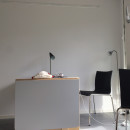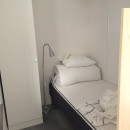a review of DIS Stockholm in its first semester; Gender Core Course Past Review
By A student (Middlebury College) - abroad from 08/20/2016 to 12/14/2016 with
DIS Stockholm Semester
exploring and making friends outside of the program was invaluable in many ways
Review Photos





Personal Information
| How much international exposure did you have prior to this program? | 6 months+ |
Review Your Program
|
* Overall educational experience
Academic rigor, intensity, resources, etc. |
|
|
* Host Country Program Administration
On-site administration of your program |
I thought their communication and administration was quite good; I felt *very* well taken-care of with regard to housing, transportation, orientation, getting books, etc. / The Stockholm program is quite small and so there are really three main people that you go to if you have problems (and all are white cis men or women, I think). This can be helpful because you know who they are and they probably know you. I didn't run into this problem but some students said it could feel limiting only having one person (for type of issue) to talk to. / Overall having grown up in small schools, I liked the small-school feel. Generally the staff are friendly. / A lot of the logistical stuff they do is amazing. The scheduling of buses, meals, events, plane tickets, etc. is quite a lot and I thought it all went quite smoothly for my core course when we traveled. / There is no Stockholm "Diverse Identities" group as there is in Cph and they need to start one for Stockholm. I think they know and are changing this. |
|
* Housing:
How satisfied were you with your living arrangements? |
I lived in an LLC in Sollentuna, outside of the city, where there are small apartments that are brand new and look like mini-IKEAs. Commute was very easy as it was close to the station - one commuter rail trip, and one metro trip to get to school, which is literally outside another station. (read: very easy) People really liked the commute as the trains were nice. Very quiet and different train culture than in NYC. / When we moved to Denmark later in the semester due to visa requirements we lived in luxury apartments which were amazing - very close to center of town, and had a gym and many ammenities. (I don't know if this will happen again.) DIS can be quite posh. / One thing: I think there are many reasons to live in a single, and I really wish I had had that option or that DIS provided that option. |
| * Food: |
I cooked for myself the whole time; I think I did a pretty good job, hence 4 stars, lol. If you don't have experience cooking for yourself, many friends struggled also being in a new country, and I imagine this is a double whammy. Many students where I lived helped feed the students that did not cook, though personally I would feel a bit vulnerable. / In the apartments in Sollentuna in the LLC, I imagined we would be in one house or have one common kitchen to cook together; this wasn't the case as the kitchens in the common rooms were quite small; I think they are expanding them for the next semester. This was a bit disappointing as cooking for one person is a lot of labor. / DIS provides a lot of super fancy meals especially on study tour, and some/most, save a few, are dietary restriction inclusive! We also had a lot of coffees or pastries or lunches covered on field trips, which really broke up the monotony of my cooking and was quite nice. A moving to Cph dinner, a goodbye dinner, really nice stuff. / If you live in a homestay this could be a benefit: having someone else do most of your cooking. / They give you food stipends. Overall if I budgeted and ate cheaply I could make it last until the end or the last week of the program. Some students had way extra if they didn't know how to cook. Some students ran out even though they budgeted, and really didn't have extra money to spend on food, and that was really terrible. / The grocery store in Stockholm is called ICA (the one that you get a card to) - it's not the super budget market, so you can get a lot of things that are vegan or gluten free or "international" if you're worried about that. |
|
* Social & Cultural Integration:
How integrated did you feel with the local culture? |
So, DIS is a program for US students, and I chose to live with other DIS students, and thus I knew coming in that I wouldn't get too much immersion. I knew this coming in. / Note that in Cph there are 1200 (!!!) new often-boisterous, English-speaking study abroad students every semester in a relatively small city, so overall one could feel more immersed in Stlm because the program is smaller. At times it can be a lot to be with DIS students all the time - especially because with US college students, going-out/clubbing/drinking culture can be super strong. At other times I was really glad to have an immediate LLC community right there in my living space. / If you have a particular interest (ex. smash bros, swing dancing) and a penchant for online searching or finding FB events, then you can meet non-DIS people, whether Swedish or not. I found a a few (like three?) close non-DIS friends that I still keep in touch with and really appreciate; that being said I know a lot of people who didn't really make outside friends (I guess I don't know if they were looking or wanted that). I noticed many people bonded closely with their host families. / Cool things I did not expect from DIS: - Even if you live with other DIS students you can have a visiting host family that you visit as much as you like. Personally I found this hard to manage time-wise and as an introvert, but many students saw their people almost every weekend and even went on trips with them. Some people did not meet up with them at all. It's a really nice touch. I observed my Swedish family and got to know their kid and about their jobs. - The teachers were a mix of Swedish and US immigrants/ex-pats and there was a distinctive US-Sweden analysis going on all the time in class, so you really got to concentrate on that. If I were just enrolled in a Swedish uni I wouldn't get that US-Sweden analysis, wouldn't get to reflect on that as much (though it would me much more immersive). - Core course is good for this. - There are many field trips. |
|
* Health Care:
How well were health issues addressed during the program? |
I did not access any physical health care other than a free STI test in Cph that was not through DIS. That was cool to experience healthcare in Scandinavia in some way. / I did access/try to access mental health care; there were some upsetting gaps in communication between the healthcare provider and DIS. I don't expect much from institutions, at the same time, I think I should expect more from DIS in terms of protocols for working with teachers, more accessible ways of learning available, etc. / I should note that a friend of mine had their learning accommodations that they usually get at their home institution denied and that was very bad on DIS' part. / There is a page on the website for accessibility issues and disability, but not much talk during the actual program. That can definitely be improved. |
| * Safety: |
Safety can be an illusory term that is so different so different people. For whom? When? Where? / Stockholm advertises itself as a safe city. I bet among large cities it is in the conventional sense. Here are also some things to consider: - Cops were nice to drunk students in metros and asked if they needed help. - Darker skinned students felt uncomfortable, stared at, touched on public transit. Not safe. - My white conventionally attractive female roommate felt very unsafe on public transit esp. at night / had many advances. - Some people would say it's very safe because it's very clean in some parts and there is a lot of public transport. - Re: the classroom. Ex. one of my teachers denied Swedish colonialism happened. Is this safe? - European study abroad programs have a strong drinking culture that can be pretty pervasive and dangerous. Not safe. Some students were drugged in their drinks - what's also very bad is that there wasn't a clear protocol to follow and I don't think they got healthcare or talked to ppl afterwards. |
| If you could do it all over again would you choose the same program? |
Yes
I would do it over again with the same program. I knew it wasn't going to be so super immersive and that was okay. I also don't have the language skills to do that many other programs, and DIS covers what I study really well. / People would like the sthlm program over the cph program because: - smaller more intimate program - fewer us students in the city as a result! - much nicer beautiful brand new classrooms, one building instead of walking around to classes - if you like taking public transportation everywhere - more of a (sometimes facade) of equality - super "clean"; a lot of white students felt more "comfortable" / And vice versa, Cph over Sthlm because: - People are perceived to be more friendly / loud - if you like biking everywhere - Less super clean - More DIS students to be friends with or find things in common with / not be the only one - more established program |
Finances
|
* Money: How easily were you able to live on a student's budget?
(1 = not very easy/$200+ on food & personal expenses/week, 2.5 = $100/week, 5 = very easily/minimal cost) |
So, groceries were basically covered in my housing situation. And transportation was covered for the most part. Most basic living costs are covered with DIS, and quite well. As mentioned many students only spent their food stipends on groceries; other students went over. / It is very expensive to eat in Sweden, more so in Denmark, due to currency exchanges. I really didn't eat out a lot; some people did. |
Language
| * Did your program have a foreign language component? | Yes |
|
How much did the program encourage you to use the language?
0 = No encouragement, 5 = frequent encouragement to use the language |
Mostly in class only. |
Other Program Information
|
* Where did you live?
Select all that apply |
|
|
* Who did you live with?
Select all that apply |
|
|
* Who did you take classes with?
Select all that apply |
|
| About how many local friends did you make that you will likely keep in touch with? |
A Look Back
| * What did you like most about the program? |
|
| * What could be improved? |
|
| * What do you know now that you wish you knew before going on this program? | Stockholm can be a good choice for a smaller, less-American filled program/city / Relatively homogenous group of people; might be more so than you're used to |
Individual Course Reviews
| Course Name/Rating: |
Gender Equality Sexuality in Scandinavia |
| Course Department: | |
| Instructor: | Anna Cavallin |
| Instruction Language: | English |
| Comments: | Overall I ***really*** enjoyed Anna's teaching style, and the core course week was a pretty awesome experience as there were so many different activities in one week related to class, that allowed us to interact in ways that would be near impossible just arranging trips ourselves. Note that my experience had many positives for me; here are also many negatives to consider: While these students were nice people, one of the big drawbacks was that some students whose majors or minors didn't align with gender studies took the class/DIS let them take the class; while I'm okay with that generally, cis white men who haven't taken a course and believe that feminism is man-hating at the beginning can really make the course more of a teaching experience for them, and a not very safe space at points. As you can imagine. If you have a lot of experience with gender studies you might find some of the material to be repeat; personally I don't mind and find it fits in with what I imagine a feminist pedagogy to be. Overall DIS can do a LOT more work with regard to talking about the issues re: race, trans issues (well, pronouns) that is happening at US colleges recently; it's not in Sweden (yet?). There should be some basic training for DIS faculty. Many working class and students of color were uncomfortable in some or all DIS classes. Note that DIS students can be very wealthy and very white if you didn't expect that already. White feminists abound! |
| Credit Transfer Issues: |








